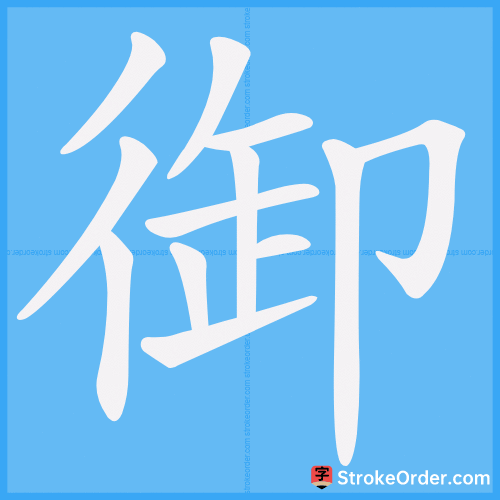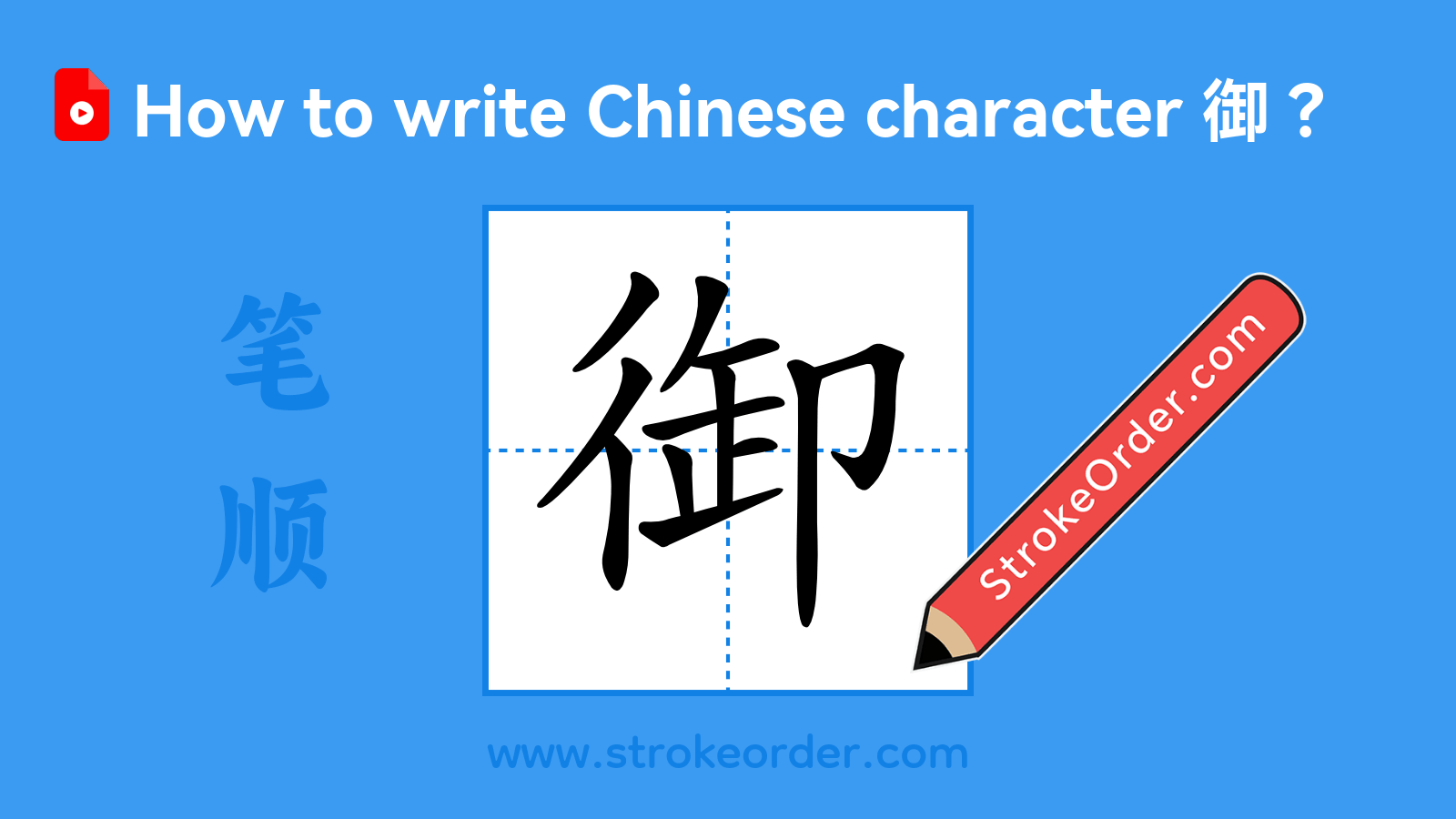御 Stroke Order
Animated Stroke Order of 御

Stroke Order Diagrams for 御

Step-by-Step Handwriting Guide for 御

Learn to Write Chinese Characters with Video Tutorials
Watch the video of writing the Chinese character "御", learn the correct stroke order (笔顺) of the character "御", and master the standard way of writing the character "御".

Free Printable Handwriting Practice with Stroke Order: 御
Printable Writing Practice Worksheet of "御" in Portrait Orientation (Tian Zi Ge)

Printable Writing Practice Worksheet of "御" in Landscape Orientation (Tian Zi Ge)

Information of 御
Pinyinyù
Radical
彳
Strokes
12 strokes
Usage
★★★★★
Definition
defend / imperial / to drive, defend / resist
御: [yù]1. 驾驶车马。(Drive a carriage or horse.)2. 封建社会指上级对下级的治理,统治。 (In feudal society, it refers to a superior ruling over a subordinate.)3. 对帝王所作所为及所用物的敬称。 (A respectful term for the actions and items of the emperor.)4. 抵挡。 (To resist.)5. 驾驶车马:~车。~者。 (Driving a carriage: ~ car. ~ driver.)6. 封建社会指上级对下级的治理,统治:“百官~事”。~下。~众。 (In feudal society, it refers to the governance and rulership over subordinates: "Officials govern their matters." Govern the subordinates. Rule over the masses.)7. 对帝王所作所为及所用物的敬称:~用。~览。~旨。~赐。~驾亲征。 (Respectful terms for the emperor’s actions and belongings: ~ use. ~ viewing. ~ edict. ~ bestowal. ~ the emperor personally leads.)8. 抵挡:防~。~敌。~寒。 (To resist: prevent ~. Resist the enemy. Resist the cold.)9. 同本义。也作“驭”。 (Same original meaning. Also written as "驭".)10. 后亦泛指驾驭一切运行或飞行之物。 (Later generalized to refer to controlling all moving or flying items.)11. 统治;治理。 (To rule; administer.)12. 控制;约束以为己用。 (To control; restrain for one's own use.)13. 统率;率领。 (To command; lead.)14. 使用;应用。 (To use; apply.)15. 载,装运。 (To charge; transport.)16. 违逆。 (To run counter to.)17. 皇帝驾临。 (The emperor's arrival.)18. 指侍奉皇帝的妃嫔。 (Refers to the concubines serving the emperor.)19. 驾驶车马的人。 (Driver of a carriage or horse.)20. 车和马。 (Carriage and horse.)21. 仆役,侍从,陪伴主人提供服务的人。 (Attendant, servant, someone who accompanies and serves the master.)22. 宫中女官名。 (Name for a female official in the palace.)23. 对帝王所作所为及所用物的敬称。 (Respectful term for the emperor’s actions and items.)24. 宫禁。 (Imperial court.)25. 息止;禁止;阻止。 (To stop; prohibit; hinder.)26. 抵御。 (To defend or resist.)27. 迎接。 (To receive.) 28. 引自诗经和楚辞的解释,说明“御”有迎接的意思。 (Cited explanation from the Book of Songs and Chuci, indicating that "御" also means to welcome.)
imperial censor (formal title of a dynastic official)
imperial chef / imperial kitchen
Doctor Yushi
to defend
defense / to defend
made by the emperor order
palace guards
to resist / to withstand
road used by the emperor
resist and defend
for use by the emperor / imperial / (derog.) in the pay of the ruler
fortification / defensive structure
imperial garden
Imperial meal
defensive (weapons)
Miran
imperial physician
to defend against the cold / to keep warm
Defensive war
Miji
resist invasion
Yudu Yushi
privy sea / broad seal / Great Seal
Yushi Zhongcheng
Yushi
variant of 駕馭|驾驭[jia4 yu4]
Input Method for 御
Pinyinyu4
Wubi
trhb|ttgb
Cangjie
hooml
Zhengma
oiiy
Four Corner
27220
Unicode
U+5fa1
Same Pronunciation Characters
予于余吁喻域娱宇寓屿御愈愉愚榆欲浴淤渔渝狱玉禹羽育舆芋裕誉语豫逾郁隅雨预鱼与伛俞俣圄圉妤妪峪嵛庾彧揄昱欤毓煜燠狳瑜瘐盂禺窳竽纡聿腴臾萸虞蜮蝓觎谀谕钰阈雩饫驭鬻鹆鹬龉娛嫗嶼慾於淯漁獄玗畬瘀癒矞禦窬籲紆
Same Radical Characters
役彻彼往征径待很徊律徐徒得徘徙御循微德徽彷徂徇徉徕徜徨徭徵徼彳彸彿後徑從徠復徯徴徹忁徧徶徎徸従徖徳彽徚徻彶徛徦徤徣彾徿徾徬徱忂徥徲徍彺徃徫徔徆忀徢徺彵徰徏徝徟彴㣪㣛㣤㣮㣷㣬㣣㣝㣵㣖㣢㣠㣚㣲㣟㣯㣰㣜㣧
本文来自静守时光投稿,不代表汉字笔顺中文网英文版立场,如若转载,请注明出处:https://www.strokeorder.cn/strokeorder/16396.html

 微信扫一扫
微信扫一扫 